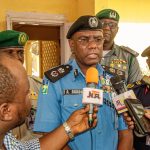Former President Olusegun Obasanjo has attributed Nigeria’s persistent battle with corruption to the failure of administrations that followed his to sustain and build upon the anti-graft initiatives he introduced while in office.
In his forthcoming book, Nigeria: Past and Future, Obasanjo expressed frustration over what he described as a lack of continuity in the war against corruption, stating that despite his efforts to diagnose the problem and offer viable solutions during his tenure, subsequent leaders failed to follow through.
Obasanjo, who led Nigeria from 1999 to 2007 after taking over from General Abdulsalami Abubakar, noted that one regime alone cannot win the fight against corruption without committed efforts from its successors.
Though he refrained from naming any specific individuals, he lamented that the administrations that succeeded his did not maintain the momentum of his anti-corruption drive.
He handed over to President Umaru Musa Yar’Adua in 2007. Following Yar’Adua’s death in 2010, Vice President Goodluck Jonathan took office and led until 2015. President Muhammadu Buhari succeeded Jonathan and remained in power until his death in July 2025. President Bola Tinubu took over the reins on May 29, 2023.
Recall that during Obasanjo’s presidency, two major anti-corruption institutions—the Independent Corrupt Practices and Other Related Offences Commission (ICPC) and the Economic and Financial Crimes Commission (EFCC)—were established. Under the leadership of Nuhu Ribadu, the EFCC prosecuted numerous former governors, ministers, and top government officials. Notably, his administration saw the arrest and conviction of then-serving Inspector General of Police, Tafa Balogun.
Reflecting on his early days in office, Obasanjo stated that he openly addressed the deep-rooted decay in government operations and laid out plans for systemic reform.
“When in 1999 I took over as democratically elected president, 27 years after my stint as military Head of State, I dwelt a little bit on the rot in government and what I would do to bring about changes and a new order.”
He recalled his inaugural address, in which he identified corruption as the greatest challenge facing Nigerian society.
He had said: “Corruption is incipient in all human societies and in most human activities, but it must be condemned. This is why laws are made and enforced to check corruption so that society will survive and develop in an orderly, reasonable and predictable way.
No society can survive anything near its full potential if it allows corruption to become the full-blown cancer it has become in Nigeria. One of the greatest tragedies of military rule in recent times is that corruption was allowed to grow unchallenged and unchecked, even when it was glaring for everybody to see. Rules and regulations for doing official business were deliberately ignored, set aside, or by-passed to facilitate corrupt practices.”
Despite his administration’s efforts, Obasanjo said he was disheartened that little was done by those who followed to continue the fight.
According to him: “A bit of diagnosis and a bit of prescription here – all to enhance governance and drastically reduce corruption. But the work of one regime without continuity by following regimes would amount to nothing. That follow-up from following regimes was not there. What a pity.”
Obasanjo argued that this lack of follow-through is a major reason why Nigeria is viewed with disappointment across Africa and globally. He recalled remarks allegedly made by late South African leader Nelson Mandela, expressing dissatisfaction with Nigeria’s political leadership.
According to Obasanjo, Mandela said: “You know I am not very happy with Nigeria. Your leaders have no respect for their people. They believe that their personal interests are the interest of the people.
They take people’s resources and turn them to personal wealth. There is a level of poverty in Nigeria that should be unacceptable. I cannot understand why Nigerians are not angrier than they are.
Your elections are like wars. Now we hear that you cannot be president in Nigeria unless you are Muslim or Christian.”
Obasanjo also quoted Mandela as having stressed that integrity is key to effective leadership.
“You should encourage leaders to emerge who will not confuse public office with sources of making personal wealth. Corrupt people do not make good leaders.
Then you have to spend a lot of resources for education. Educate children of the poor, so that they can get out of poverty. Poverty does not breed confidence. Only confident people can change things. Poor and uneducated people can also bring changes, but it will be hijacked by the educated and the wealthy…give young Nigerians good education.
Teach them the value of hard work and sacrifice and discourage them from crimes which are destroying your image as a good people,” Obasanjo quoted Mandela to have said.











